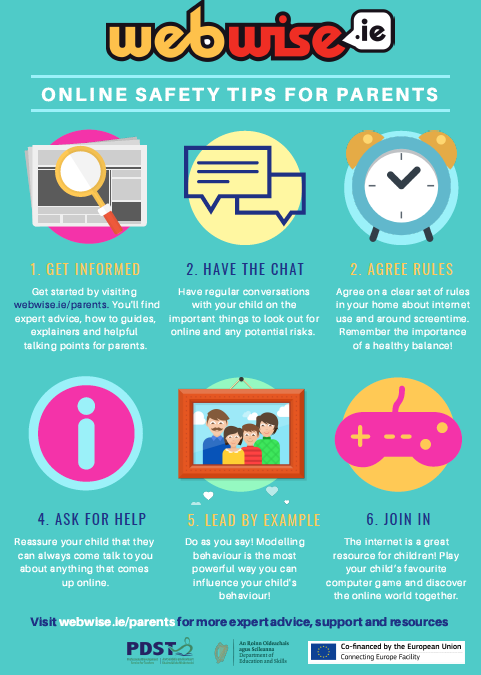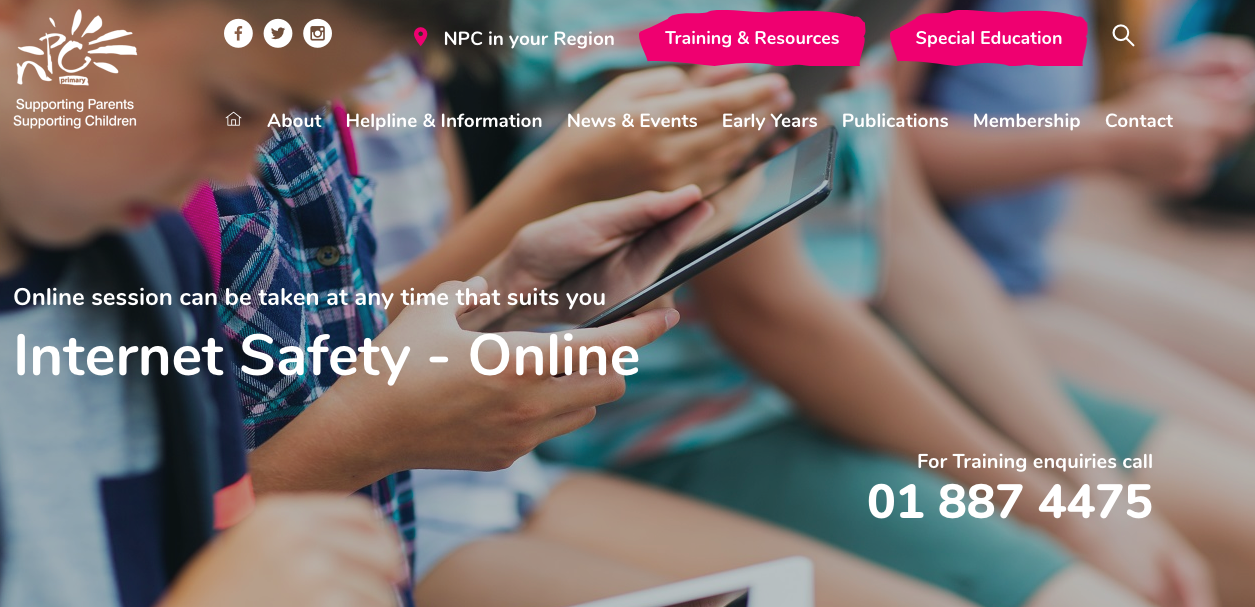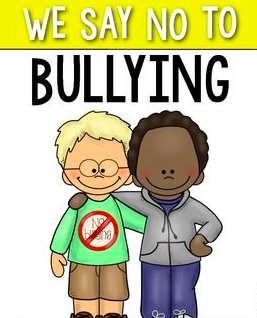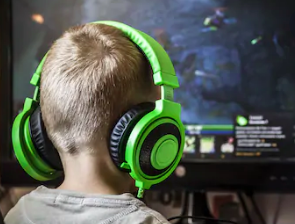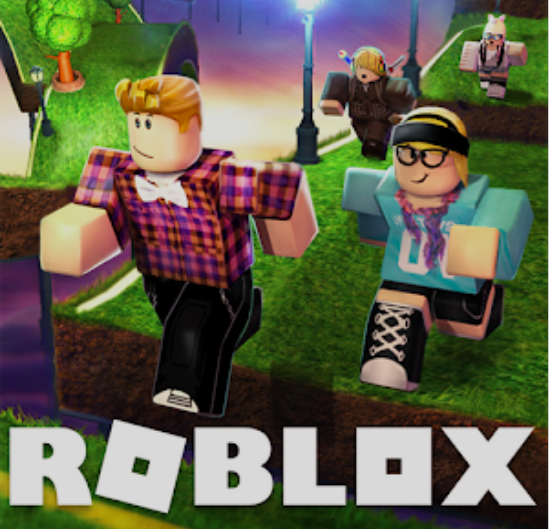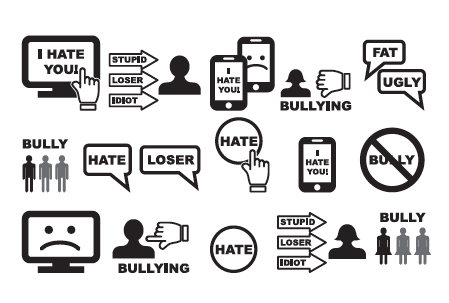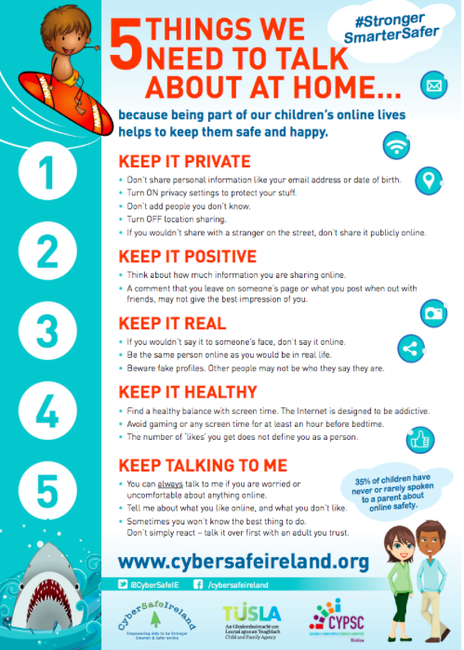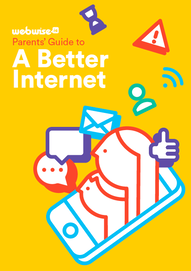Online Safety Information for Parents
This page is one of a suite of pages to support families learning at home during Covid-19. We hope this page helps you to stay safe online.
Internet Safety for Parents
*free online session*
Did you know that the National Parents' Council provides internet safety training for parents?
Click here for further details.
Click here for further details.
Supports for Parents
NPC Primary (National Parents' Council) – Helpline
NPC Information/Helpline is a confidential service for parents. The Information/Helpline officers listen, and give information and support to parents to help them make the best possible decisions for and with their children.
Contact the Helpline on Tel: 01-8874477 email: helpline@npc.ie
The Helpline is open from: Monday & Tuesday from 10am to 4pm; Wednesday to Friday from 10am to 5pm
NPC Primary (National Parents' Council) – Helpline
NPC Information/Helpline is a confidential service for parents. The Information/Helpline officers listen, and give information and support to parents to help them make the best possible decisions for and with their children.
Contact the Helpline on Tel: 01-8874477 email: helpline@npc.ie
The Helpline is open from: Monday & Tuesday from 10am to 4pm; Wednesday to Friday from 10am to 5pm
Bystanders to Bullying
Someone who witnesses bullying, either in person or online, is a bystander. Friends, students, peers, teachers, school staff, parents, coaches, and other youth-serving adults can be bystanders. With cyberbullying, even strangers can be bystanders.
Youth involved in bullying play many different roles. Witnessing bullying is upsetting and affects the bystander, too. Bystanders have the potential to make a positive difference in a bullying situation by becoming an upstander. An upstander is someone who sees what happens and intervenes, interrupts, or speaks up to stop the bullying.
There are many things that bystanders to bullying can do to become upstanders:
Youth involved in bullying play many different roles. Witnessing bullying is upsetting and affects the bystander, too. Bystanders have the potential to make a positive difference in a bullying situation by becoming an upstander. An upstander is someone who sees what happens and intervenes, interrupts, or speaks up to stop the bullying.
There are many things that bystanders to bullying can do to become upstanders:
- Question the bullying behavior. Simple things like changing the subject or questioning the behavior can shift the focus.
- Use humor to say something funny and redirect the conversation.
- There is strength in numbers too! Bystanders can intervene as a group to show there are several people who don’t agree with the bullying.
- Walk with the person who is the target of bullying to help diffuse potential bullying interactions.
- Reach out privately to check in with the person who was bullied to let them know you do not agree with it and that you care. It makes a difference.
- Be Someone’s Hero video in English or Spanish for an example of how to be an upstander.

|
Click here to find out more about bystanders to bullying.
|
What's that App?
|
Using Technology in a Positive WayWe are hearing a lot about how technology can be misused and abused. It's important to remember, however, the many, many positive ways in which technology is connecting people, and providing hope, education and entertainment. Click here to read about using technology in a positive way.
|
7 Things Parents Need to Know About Snapchat |
What's that App?Snapchat is a mobile messaging application used to share photos, videos, text, and drawings. It’s free to download the app and free to send messages using it. It has become hugely popular in a very short space of time, especially with young people. There is one feature that makes Snapchat different from other forms of texting and photo sharing: the messages disappear from the recipient’s phone after a few seconds.
Lots of young people are using Snapchat, if your child is one of them click here for some things you need to know about the popular messaging app. |
|
|
If something we, or our children, see online makes us feel worried or upset, it can help to talk.
We encourage you to watch this video with your child (now...before there is an issue) so that they learn that "talking makes us stronger". Click here for tips from "Childline" on enjoying the internet safely. Share these tips with your child. |
Play it Safe - Online Gaming
|
Online Gaming Talking Point for Parents
Here is a helpful guide to opening conversations about online gaming with your child. It is important to know the content of the games your child is playing and whether they are playing on their own or with others. Click here for tips on how to frame these conversations with your child. |
Click here for details. |
|
A new public awareness campaign, launched recently, encourages people of all ages to Stop, Think, and Check that the information they see, read or hear across any media platform is reliable.
The ‘Be Media Smart’ campaign is designed to help people identify sources of information that may be unreliable, as well as deliberately false or misleading information. It will enhance people’s understanding of, and engagement with media, while also empowering them with the skills to evaluate content across all platforms. Click here for further information. |
Click here to view a short video clip about being media smart.
|
Play it Safe - Online Gaming
Is your child gaming online? Click here for an introductory guide to online gaming for children. Included is an interview with Simon Grehan, Internet Safety Officer, Department of Education and Skills, who offers advice on staying safe online.
What is Fortnite Battle Royale?Click here to find out.
|
|
"We need to talk about cyberbullying..."
Online bullying is something you should talk about with your child before it happens so that they know what to do when / if it happens. Click here to access sound advice on this hot topic. |
Supports for Parents
NPC Primary (National Parents' Council) – Helpline
NPC Information/Helpline is a confidential service for parents. The Information/Helpline officers listen, and give information and support to parents to help them make the best possible decisions for and with their children.
Contact the Helpline on Tel: 01-8874477 email: helpline@npc.ie
The Helpline is open from: Monday & Tuesday from 10am to 4pm; Wednesday to Friday from 10am to 5pm
Free Online Training for Parents on Internet Safety
The NPC offers free online training for parents. The overall objective of this online session is to provide parents with information and skills to support their children’s online activity. Click here to access this free resource.
NPC Primary (National Parents' Council) – Helpline
NPC Information/Helpline is a confidential service for parents. The Information/Helpline officers listen, and give information and support to parents to help them make the best possible decisions for and with their children.
Contact the Helpline on Tel: 01-8874477 email: helpline@npc.ie
The Helpline is open from: Monday & Tuesday from 10am to 4pm; Wednesday to Friday from 10am to 5pm
Free Online Training for Parents on Internet Safety
The NPC offers free online training for parents. The overall objective of this online session is to provide parents with information and skills to support their children’s online activity. Click here to access this free resource.
Ok so we've all heard of, and probably use, the platform YouTube. With over a billion users it is important to be aware of the risks involved in using it.
Click here for information on managing privacy settings and setting up parental controls to keep your child safe on this platform. |
|
It's really important to have open conversations with your child about being safe online.
Click here for further information.
Click here for further information.
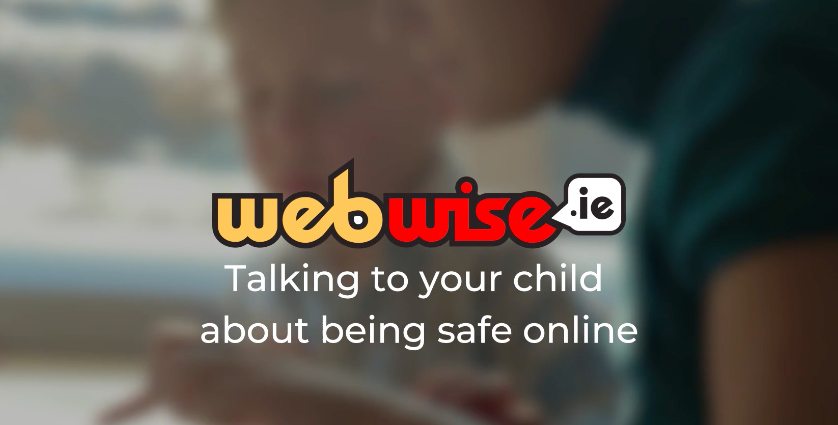
What's that App?Have you ever wondered what Tik Tok is all about?
It's a platform for creating, sharing and discovering short music videos. The app has a minimum user age of 13 years old & as the digital age of consent in Ireland is 16 years old, for children under that age consent must be given by the parent or guardian. Click here to read more. |
Tik Tok |
Here's a reminder from Cybersafe Ireland on the importance of communicating openly with our children to keep them safe and happy online.
Check it out and share the information with your child.
Check it out and share the information with your child.
|
With more and more of our children learning, playing and socialising online, Áine Lynch, CEO of the National Parents Council Primary offers advice to parents on supporting their children should something go wrong. This 3 minute clip offers support should your child run into difficulty online. |
|
|
With more and more people using zoom at this time, click here to learn what this tool has to offer.
This link explains how zoom works, why it is popular and outlines privacy and security concerns. There is advice for parents using this platform to communicate with others at the bottom of the page. |
Parent Guide to a Better Internet
|
This booklet will help parents to help their children have a positive experience when they are online. It provides information, advice and conversation starters about the benefits and risks they need to be aware of when using the internet. Topics explored in the guide include cyberbullying, screen time, sexting, social media and online pornography.
Download your copy for free here: Parents Guide to a Better Internet. Download the Irish version here. |
Check out this short clip where Áine Lynch, CEO of the National Parents Council Primary offers advice on managing screen time in the home. |
|
WHAT'S THAT APP?

This app allows users to chat with up to 8 others. The idea is that when you open the app it is similar to going to a house party where you can chat with other people who are there. When you use the app, your friends will be alerted that you are available to video chat, or that you are “in the house”.
Houseparty uses a split screen to make multiple video-chatting easy between multiple users, adding in a feature that allows for secret chats among participants. You can also create rooms and ask people to join your video-chat room by sending a link through SMS text message.
The app is available free to download, sign-up is easy and it is integrated with Snapchat to make creating a profile a seamless experience. Under its Terms of Service, users must be 13 years of age, however, the Digital Age of Consent is set at 16 years of age in Ireland meaning that children under that age should not use this app without parental consent. The app asks for date of birth during the sign-up but no other age verification is used. To “Find Friends” and to verify that you are a real person, you are asked to provide your mobile number. You are then given a confirmation code and can give Houseparty access to your address book or can use Snapchat or Facebook to find friends using the app.
Why do children like it?
One of the main reasons children like this app is the ability to talk to all their friends at the same time. There are also a number of features that appeal to young users:
o Young people are able to video chat or call friends. o The app is free and does not contain any in-app purchases.
o There are extra features while video chatting such as changing the camera view or turning off the microphone.
o You can leave ‘Facemail’ – a short video message to friends if they are not currently using the app
o There is a gaming element to the app called ‘Wins’ whereby the app will give you a win for doing certain ‘secret’ tasks like sharing your chat room or inviting friends.
o You can use the app to send notes to your friends or to groups of friends.
o Users can also upload their own personal emojis (Bitmoji) as their profile picture on Houseparty if they are connected with their Snapchat account
o You are able to use the app without other people knowing, known as ‘sneaking around the house’. This is a feature offered to all users on Houseparty.
o You can also ‘ghost’- meaning that you can switch to anonymous mode
o You can lock a chat room so that only people you would like in the room can access it
Advice for Parents and Young People
Reporting on Houseparty
Users must contact Houseparty if they see behaviour that they are not comfortable with. To do this they can ‘shake’ the phone to leave feedback.
Click the ‘Report a Problem’ to report any instances of cyberbullying, inappropriate comment or other issues.
There are a number of Houseparty rules that users are asked to follow: https://houseparty.com/guidelines.
Get advice on live-streaming here: https://www.webwise.ie/parents/explained-live-streaming/
*For further information on this app see https://www.webwise.ie/parents/explained-what-is-houseparty/
Houseparty uses a split screen to make multiple video-chatting easy between multiple users, adding in a feature that allows for secret chats among participants. You can also create rooms and ask people to join your video-chat room by sending a link through SMS text message.
The app is available free to download, sign-up is easy and it is integrated with Snapchat to make creating a profile a seamless experience. Under its Terms of Service, users must be 13 years of age, however, the Digital Age of Consent is set at 16 years of age in Ireland meaning that children under that age should not use this app without parental consent. The app asks for date of birth during the sign-up but no other age verification is used. To “Find Friends” and to verify that you are a real person, you are asked to provide your mobile number. You are then given a confirmation code and can give Houseparty access to your address book or can use Snapchat or Facebook to find friends using the app.
Why do children like it?
One of the main reasons children like this app is the ability to talk to all their friends at the same time. There are also a number of features that appeal to young users:
o Young people are able to video chat or call friends. o The app is free and does not contain any in-app purchases.
o There are extra features while video chatting such as changing the camera view or turning off the microphone.
o You can leave ‘Facemail’ – a short video message to friends if they are not currently using the app
o There is a gaming element to the app called ‘Wins’ whereby the app will give you a win for doing certain ‘secret’ tasks like sharing your chat room or inviting friends.
o You can use the app to send notes to your friends or to groups of friends.
o Users can also upload their own personal emojis (Bitmoji) as their profile picture on Houseparty if they are connected with their Snapchat account
o You are able to use the app without other people knowing, known as ‘sneaking around the house’. This is a feature offered to all users on Houseparty.
o You can also ‘ghost’- meaning that you can switch to anonymous mode
o You can lock a chat room so that only people you would like in the room can access it
- Users can also send photos to other users and make new friends through the messaging service.
- The potential for bullying is quite real with this app. It has a number of features that could be used to exclude, or bully others.
- Strangers and ‘friends of friends’ are notified about ongoing chats and can join the video chat conversation. While strangers who are not on your contact list are highlighted by a notification “Stranger Danger”, they can still be easily added to the chat. Talk to your child about making friends online and that not everyone is who they say they are.
- The platform is integrated with Facebook and Snapchat. The worry here is that they begin to video chat with users they do not know on Houseparty and continue these friendships into other platforms where they share more information. As this app allows for video chatting, there is the concern that younger users may be exposed to inappropriate language and content.
- Users can take screen records of private video chats without the other participants knowing
- Users can opt to make their accounts private, otherwise, there is a concern that people can ‘sneak’ into the app and see who you are talking to or join chats if they are unlocked.
Advice for Parents and Young People
- Talk to your child about making friends online or speaking with people anonymously. Remind them neverto give out personal information online, or give access to other platforms they use where personal information can be found. Check out our guide to sharing online:https://www.webwise.ie/parents/talking-points-posting-sharing-online/.
- Ask your child to use the app only with people they know. If a stranger enters a room or a conversation – let your child know that it is okay to leave the room.
- If your child is using the app to connect with friends, make sure they lock their chats and do not allow unknown users to join.
- Remind your child to #BeInCtrlof what they post online and remind them that anything that is put out on the internet can be recorded and shared more publically without consent.
- Be kind- have a conversation with your child about cyberbullying and whether or not they want to be an upstander or a bystander. Exclusion is a form of bullying.
- Encourage your child to use a personal emoji instead of a real photo for their profile.
- Remind your child that other users do not have to verify their age – meaning that ‘friends of friends’ may be any age.
- Make sure that your child is aware that they can put their profile on private meaning that all the conversations they have will not allow others to join.
- Show your child how to make their profile private and how to turn off their location! It is easy to do- just click on the settings on the top right-hand corner in the app.
Reporting on Houseparty
Users must contact Houseparty if they see behaviour that they are not comfortable with. To do this they can ‘shake’ the phone to leave feedback.
Click the ‘Report a Problem’ to report any instances of cyberbullying, inappropriate comment or other issues.
There are a number of Houseparty rules that users are asked to follow: https://houseparty.com/guidelines.
Get advice on live-streaming here: https://www.webwise.ie/parents/explained-live-streaming/
*For further information on this app see https://www.webwise.ie/parents/explained-what-is-houseparty/
